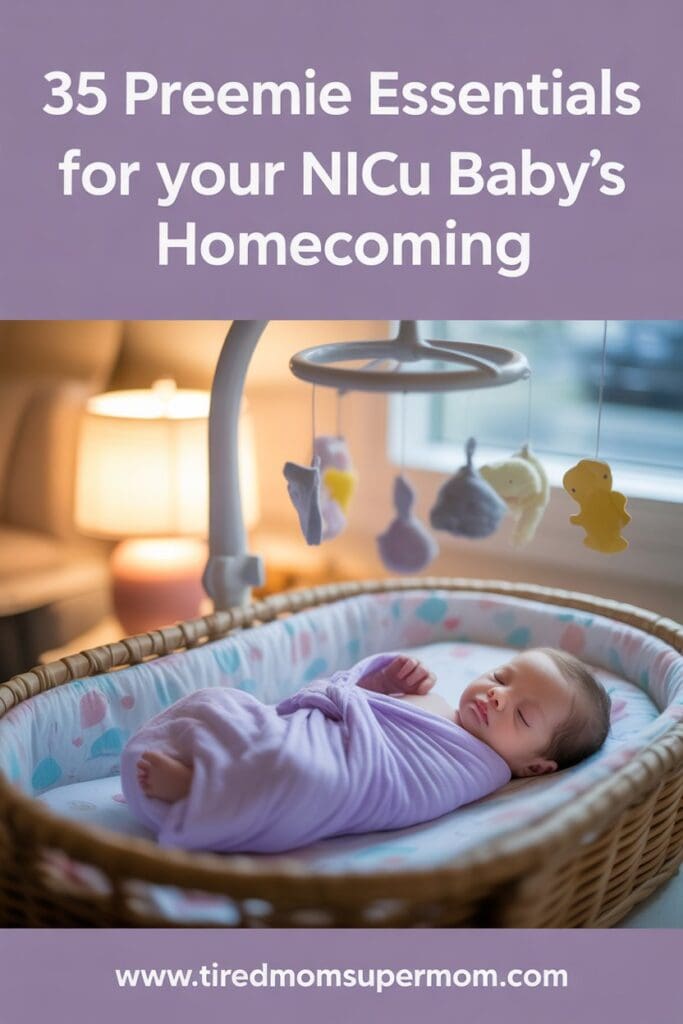35 Important Preemie Essentials for Your NICU Baby’s Homecoming
When your baby arrives earlier than expected, everything changes — including what you actually need at home. Standard newborn gear might not work for a preemie, and NICU babies often require extra care, gentler tools, and smaller sizes.
This list of preemie essentials was created to help you confidently navigate this new journey. It’s practical, Amazon-linked where helpful, and designed for families preparing to bring home a NICU graduate.
Heads up: This post may include affiliate links. As an Amazon Associate, I earn from qualifying purchases—at no extra cost to you. Full privacy policy and disclosure here.
👶 Quick Summary: Preemie Essentials at a Glance
Bringing home a preemie can be overwhelming, but the right gear makes all the difference. Here’s what you’ll need to care for your baby with confidence:
- Soft, NICU-friendly preemie clothes
- Specialized feeding supplies and bottles
- Gentle skincare and grooming tools
- Lightweight blankets and preemie-safe swaddles
- A reliable thermometer and humidifier
- Support for bonding, sleep, and developmental care
Now, let’s dive into the top preemie essentials you’ll want on hand for those first precious weeks at home.
🍼 Preemie Essentials for Feeding
1. Preemie-Sized Bottles and Nipples
Preemies often need special slow-flow nipples to manage feeds safely.
✅ Try: Dr. Brown’s Preemie Flow Bottles
2. Bottle Warmer
A warm bottle helps with digestion and comfort, especially for sensitive preemie tummies.
3. Sterilizer for Bottles and Pacifiers
Keep everything sanitized to protect your baby’s developing immune system.
✅ Try: Philips Avent 3-in-1 Sterilizer
4. Burp Cloths (Lots of Them!)
Preemies may spit up more often — always keep one handy.
👕 Clothing Preemie Essentials
5. NICU-Friendly Preemie Outfits
Look for side snaps, Velcro closures, and gentle fabrics.
✅ Try: Little Me Preemie Clothes Set
6. Preemie-Sized Hats
Preemies struggle to regulate temperature — hats are a must.
7. Mittens and Booties
Protect their delicate skin and help retain heat.
🧴 Diapering and Hygiene Must-Haves
8. Preemie Diapers
Regular newborn diapers are often too big.
✅ Try: Huggies Little Snugglers Preemie Size
9. Sensitive Wipes
Choose unscented, water-based options safe for fragile skin.
10. Diaper Rash Cream (Fragrance-Free)
Even gentle diapers can cause irritation on delicate skin.
💤 Sleep and Soothing Preemie Essentials
11. Sleep Sacks for Preemies
Safer than loose blankets and easier than swaddles.
✅ Try: SwaddleMe Pod for Preemies
12. White Noise Machine
Helps mimic the NICU and soothe fussiness.
13. Humidifier
Adds moisture to dry air, easing breathing and skin dryness.
14. Pacifiers Designed for Preemies
Look for hospital-grade silicone pacifiers made for small mouths.
🩺 Health and Safety Gear
15. Digital Thermometer
A must for monitoring fevers in fragile babies.
✅ Try: iProven Baby Thermometer
16. Nasal Aspirator
Preemies can’t clear their own noses.
✅ Try: NoseFrida Nasal Aspirator
17. Gentle Nail Clippers or Emery Boards
Tiny nails need regular maintenance to avoid scratches.
18. Infant First Aid Kit
Keep everything you need for minor concerns in one spot.
🏠 Nursery Must-Haves for Preemies
19. Preemie-Safe Crib Sheets and Mattress
Go for fitted, breathable materials that reduce SIDS risk.
20. Bassinet for Room-Sharing
Essential for safe sleep and easier nighttime care.
21. Nightlight for Late Feeds
Avoid overstimulation during midnight changes.
❤️ Bonding and Developmental Preemie Essentials
22. Skin-to-Skin Wrap or Carrier
Fosters bonding and temperature regulation.
✅ Try: Boba Baby Wrap Carrier
23. Tummy Time Mat
Support early development gently and safely.
24. Black-and-White Toys or Books
Stimulate newborn vision without overwhelming them.
🧠 Mental Health and Support
25. Parenting Books About Prematurity
Knowing what to expect eases anxiety.
🔗 Try: March of Dimes – Preemie Resources
26. NICU Parent Support Group
Connecting with others who’ve been there can be a lifesaver.
🧳 Other Helpful Items
27. Hospital Bag Snacks
When visiting the NICU or prepping for discharge, you’ll want quick snacks.
28. Extra Hand Sanitizer (Everywhere!)
Protect baby’s immune system by keeping germs at bay.
29. Lactation Support Items (If Breastfeeding)
Pumps, milk storage bags, and nipple cream are helpful.
✨ Bonus: 6 Preemie Essentials You Might Not Know You Need
- Dimmer Light Switch for Nursery
- Preemie-Sized Car Seat (Check Weight Rating!)
- Hands-Free Pumping Bra
- Swaddle Transition Product (like Merlin’s Sleep Suit)
- Preemie Baby Monitor with Oxygen Tracking
- CPR Course for Parents (Online or In-Person)
❓ FAQ: Preemie Essentials
What size is considered preemie for clothes and diapers?
Preemie size usually fits babies under 5 lbs. Clothes are designed with side snaps or Velcro, and preemie diapers are smaller than standard newborn sizes.
Do I need different bottles for a preemie baby?
Yes. Preemies often need slow-flow nipples or specialty bottles like Dr. Brown’s to help with reflux and proper pacing during feeds.
Is it safe to co-sleep with a preemie?
Room-sharing is encouraged, but co-sleeping in the same bed is not recommended. Use a bassinet near your bed to reduce SIDS risk.
How can I bond with my preemie at home?
Skin-to-skin contact, reading aloud, and gentle infant massage are all great ways to bond while supporting your baby’s development.
What’s different about bringing a preemie home?
Preemies may require oxygen, medication, or extra feeding support. You’ll also need smaller clothing, specialty gear, and a heightened awareness of germs and temperature changes.
💬 Final Thoughts
Bringing your baby home from the NICU is a major milestone — and with these preemie essentials, you can be prepared, confident, and calm. You’ve got this!
💬 What was the #1 item on your preemie checklist? Leave a comment below and help other parents feel more ready, too.
📌 Don’t forget to Pin this post to your baby prep board so you can find it when you need it most!

